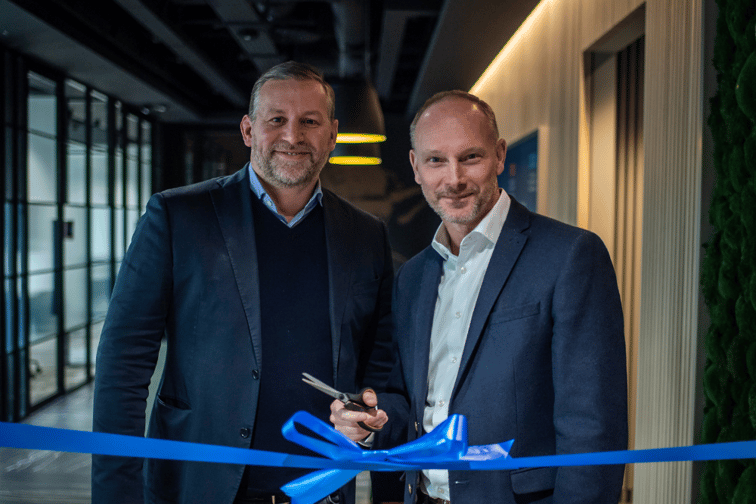

Between rumblings of the Great Resignation, the shift to hybrid working, and the escalating reality of increased automation, the insurance profession is fielding a lot of discussions about the workforce of the future. But for the team at CFC, the question of the workplace of the future is an equally critical consideration, and one at the crux of the company’s decision to launch a dedicated Innovation Hub in the heart of the City.
Inaugurating the new premises, which will act as CFC’s research and development centre, group CEO Dave Walsh (pictured right) noted that the development emphasises CFC’s commitment not just to innovation but also to supporting its tech talent. In a lot of businesses, he said, it can seem the salespeople in the front office are the ones who get the support, while those in the back office feel less important. But for CFC, collaboration is the name of the game and supporting the full gamut of the talent that it takes to succeed and thrive is critical.
Discussing the launch, Jon Fletcher (pictured left), CTO at CFC, said he was “incredibly excited” to be able to throw open the doors of the new hub office and welcome the MGA’s tech engineers to their new headquarters.
“I had a vision for what it would look like not that long ago and it’s amazing how far it’s come in such a short amount of time,” he said. “But my expectations of what it would be like have been exceeded. The feedback from the team has been great, they’re really enthused and really excited. So, it’s up to us now to maintain that buzz as we continue to grow. And hopefully, this serves as a point of attraction for people to come to us.”
The space has been designed to support the collaborative and hybrid working conditions that give the team the flexibility they desire, and it has the capacity to accommodate the anticipated future growth of the team. The time was right for the new office, he said, not least because CFC’s original headquarters were running out of space. Fletcher highlighted that CFC’s tech team has grown significantly since he joined, from about 30 people to around 100 people – a rate of growth that requires constant levelling up.
“I’m always saying to the team, if we want to be the best tech team in insurance, we have to have the best people, the best technology, the best office and everything around that,” he said. “So I think this is representative of that ambition and of where we want to get to. And technology is a massive part of our value proposition and of how we differentiate ourselves from others. It’s central to the business and runs through everything we do.”
What’s quite unique to CFC’s approach to technology is that it is embraced for its value-add potential as opposed to just its cost-saving implications. A lot of other insurance companies use technology to drive down costs rather than as an integral element of their proposition, he said, while CFC utilises it as a differentiator and as a way to help insureds.
At the heart of discussions about the workplace is the balancing act that is keeping a team culture alive in a hybrid-working environment, which Fletcher noted is why CFC heavily leaned into the social aspects of designing the new office. Getting the combination of tech and talent right isn’t always easy to do, he said, but as a challenger brand in the market, the business is looking to change the conversation around what tech talent looks like.
“Our focus is [zeroing in] on the softer skills as opposed to just the hardcore, technical skills,” he said. “I really want people coming in who are ambitious, who are team players, who want to be part of growing an amazing business and who can hold each other and themselves to account. We’re bringing in people with all those kinds of soft skills that you maybe wouldn’t traditionally associate with techies.
“Getting that social cohesion part right and having a workforce where people gel well together and are friends is the most important thing. I think if you’ve got the right attitude, you’re going to learn the skills. To do something differently you need people that think a bit differently - who are entrepreneurial, who are innovative, who are confident in putting their head above the parapet and challenging the accepted way of thinking.”
CFC’s current hybrid working model is an effective one, Fletcher said, because he firmly believes in the power of having people together in the office – at least part of the time. What people want from their working conditions does, of course, vary from person to person – with some happier to work at home and others keen to be part of a team and part of something bigger.
“My natural tendency is to veer towards people that want to be together,” he said. “Because it has been proven that we can work fully remotely. As a business, we proved over two years that it works at a transactional level. What hasn’t been proven are the long-term cultural or team impacts of that [working model].
“I’m convinced that being in person is the best way to communicate and the best way to build a culture – in full acknowledgement that you can do those things at home, it’s just better in person. And that’s back to the idea that if you want to be the best, you’ve got to choose all the best things. And the optimal mode of collaborating is to be in person.”
